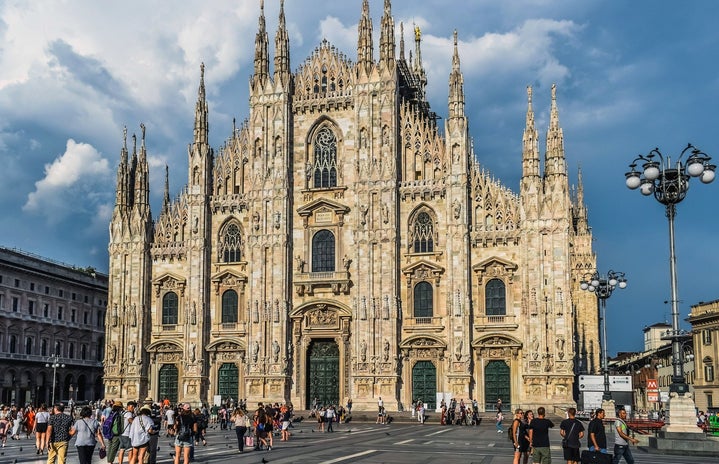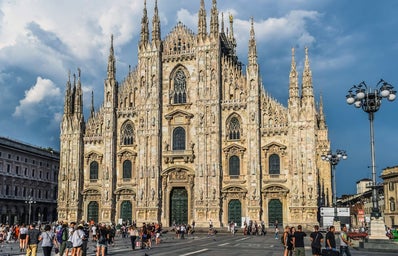Over the semester, my perspective on the fear associated with death has evolved as I have developed a deeper understanding of death’s entanglement with fear and organized religion. My initial, simplistic view of the relationship between fear and death reflects my first-impression analysis of Dylan Thomas’ poem “And Death Shall Have No Dominion.” However, after reading Psalm 6, I see Thomas’ poem through a new lens–one sharpened by my appreciation of the role organized religion, in this instance, Christianity plays in defining how and why fear accompanies death.
In my initial read of “And Death Shall Have No Dominion,” I focused my attention on Thomas’ line, “And death shall have no dominion. / Dead men naked they shall be one” (Thomas, lines 1-2). However, after rereading Psalm 6 and the poem, I realize my claims about why Thomas chose to take power away from death were too broad. In my post, I concluded the reference to all dead men as “one” indicates that once dead, we are the same regardless of life experience. Death unites mankind instead of dividing it.
Initially, I argued Thomas’ recognition of the fear that accompanies death drove him to write a poem that demystifies death by taking its power away, presenting death as inclusive. To me, Thomas’ intentional repetition of “death shall have no dominion” revealed that death’s power only exists in theory, and therefore, we need not be fearful. I assumed that the world’s fear of death stemmed from the idea that when we die, we develop permanent separation from our loved ones with no knowledge of what comes next. I saw Thomas’ effort to debunk separation in death as an antidote to what generates fear of death in me.
Having now focused on how religion contributes to the relationship between fear and death, I realize I failed to account for religion’s role in how and why fear and death coincide. As a desperation poem, Psalm 6 touches on the relationship between ongoing suffering and death. More specifically, the Psalm tells the story of King David and his fear of dying without being forgiven for his sins: “For in death there is no remembrance of thee: in the grave who shall give thee thanks?” (Psalm 6:5, KJV). Here, David expresses apprehension about dying, suggesting that death will hurt God–one less person to remember and give God thanks. This apprehension comes from the realization that David’s ability to honor God will be gone once dead. I never before considered that a majority of the world’s unease surrounding death comes not for fear of separation from their family but rather from worry about their ability to worship God. Since I lack strong ties to organized religion, I never reckoned with how Christian self-worth and self-identification manifests itself in fear of no longer being able to do that which gives life purpose and meaning–namely, praising and thanking God. However, now I realize that death’s fear factor comes from the potential loss of connection to God’s higher power for individuals like David.
Even though my angst towards death lacks influence by organized religion, I now realize the role Christianity plays in the unease surrounding death. Reflecting on my analysis of “And Death Shall Have No Dominion,” I see my discussion of death and fear as surface level. Fear chaperones death for many reasons, some of which are more nuanced than I realized. For some, death generates fear simply because of the immense power we give it. But, for many, death deserves such power and fosters fear because it possibly terminates one’s connection to God as understood in life.
Over the semester, my perspective on the fear associated with death has evolved as I have developed a deeper understanding of death’s entanglement with fear and organized religion. My initial, simplistic view of the relationship between fear and death reflects my first-impression analysis of Dylan Thomas’ poem “And Death Shall Have No Dominion.” However, after reading Psalm 6, I see Thomas’ poem through a new lens–one sharpened by my appreciation of the role organized religion, in this instance, Christianity plays in defining how and why fear accompanies death.
In my initial read of “And Death Shall Have No Dominion,” I focused my attention on Thomas’ line, “And death shall have no dominion. / Dead men naked they shall be one” (Thomas, lines 1-2). However, after rereading Psalm 6 and the poem, I realize my claims about why Thomas chose to take power away from death were too broad. In my post, I concluded the reference to all dead men as “one” indicates that once dead, we are the same regardless of life experience. Death unites mankind instead of dividing it.
Initially, I argued Thomas’ recognition of the fear that accompanies death drove him to write a poem that demystifies death by taking its power away, presenting death as inclusive. To me, Thomas’ intentional repetition of “death shall have no dominion” revealed that death’s power only exists in theory, and therefore, we need not be fearful. I assumed that the world’s fear of death stemmed from the idea that when we die, we develop permanent separation from our loved ones with no knowledge of what comes next. I saw Thomas’ effort to debunk separation in death as an antidote to what generates fear of death in me.
Having now focused on how religion contributes to the relationship between fear and death, I realize I failed to account for religion’s role in how and why fear and death coincide. As a desperation poem, Psalm 6 touches on the relationship between ongoing suffering and death. More specifically, the Psalm tells the story of King David and his fear of dying without being forgiven for his sins: “For in death there is no remembrance of thee: in the grave who shall give thee thanks?” (Psalm 6:5, KJV). Here, David expresses apprehension about dying, suggesting that death will hurt God–one less person to remember and give God thanks. This apprehension comes from the realization that David’s ability to honor God will be gone once dead. I never before considered that a majority of the world’s unease surrounding death comes not for fear of separation from their family but rather from worry about their ability to worship God. Since I lack strong ties to organized religion, I never reckoned with how Christian self-worth and self-identification manifests itself in fear of no longer being able to do that which gives life purpose and meaning–namely, praising and thanking God. However, now I realize that death’s fear factor comes from the potential loss of connection to God’s higher power for individuals like David.
Even though my angst towards death lacks influence by organized religion, I now realize the role Christianity plays in the unease surrounding death. Reflecting on my analysis of “And Death Shall Have No Dominion,” I see my discussion of death and fear as surface level. Fear chaperones death for many reasons, some of which are more nuanced than I realized. For some, death generates fear simply because of the immense power we give it. But, for many, death deserves such power and fosters fear because it possibly terminates one’s connection to God as understood in life.


